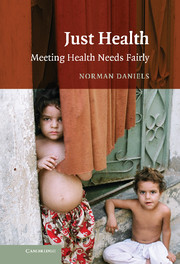Book contents
- Frontmatter
- Contents
- Acknowledgments
- Introduction
- PART I A THEORY OF JUSTICE AND HEALTH
- 1 Three Questions of Justice
- 2 What Is the Special Moral Importance of Health?
- 3 When Are Health Inequalities Unjust?
- 4 How Can We Meet Health Needs Fairly When We Can't Meet Them All?
- 5 What Do We Owe Each Other?
- PART II CHALLENGES
- PART III USES
- References
- Index
4 - How Can We Meet Health Needs Fairly When We Can't Meet Them All?
Accountability for Reasonable Resource Allocation
Published online by Cambridge University Press: 05 June 2012
- Frontmatter
- Contents
- Acknowledgments
- Introduction
- PART I A THEORY OF JUSTICE AND HEALTH
- 1 Three Questions of Justice
- 2 What Is the Special Moral Importance of Health?
- 3 When Are Health Inequalities Unjust?
- 4 How Can We Meet Health Needs Fairly When We Can't Meet Them All?
- 5 What Do We Owe Each Other?
- PART II CHALLENGES
- PART III USES
- References
- Index
Summary
Knowing that health is of special moral importance because of its impact on opportunity gives us general guidance in the design of systems that meet health needs. Similarly, knowing that achieving equity in health requires broader social justice gives us general guidance about social policy that impacts health. Unfortunately, this general guidance does not tell us how to meet health needs fairly when we cannot meet them all, our third Focal Question. The general principles of justice for health that we have been discussing are simply too general and too indeterminate to resolve many reasonable disputes about how to allocate resources fairly to meet health needs, and we lack a consensus on more fine-grained principles. Moreover, we cannot avoid this problem. It arises in all health systems whether or not they meet other basic requirements of justice – for example, whether or not they provide universal access to preventive and curative public health and medical services.
The moral controversy that surrounds the creation of winners and losers in resource allocation decisions results in a legitimacy problem: Under what conditions do decision makers have the moral authority to set the limits they impose? To solve this legitimacy problem and to answer the third Focal Question, we must supplement general principles of justice with a fair process for setting limits. Such a process holds decision makers accountable for the reasonableness of the limits they set.
- Type
- Chapter
- Information
- Just HealthMeeting Health Needs Fairly, pp. 103 - 139Publisher: Cambridge University PressPrint publication year: 2007
- 1
- Cited by



